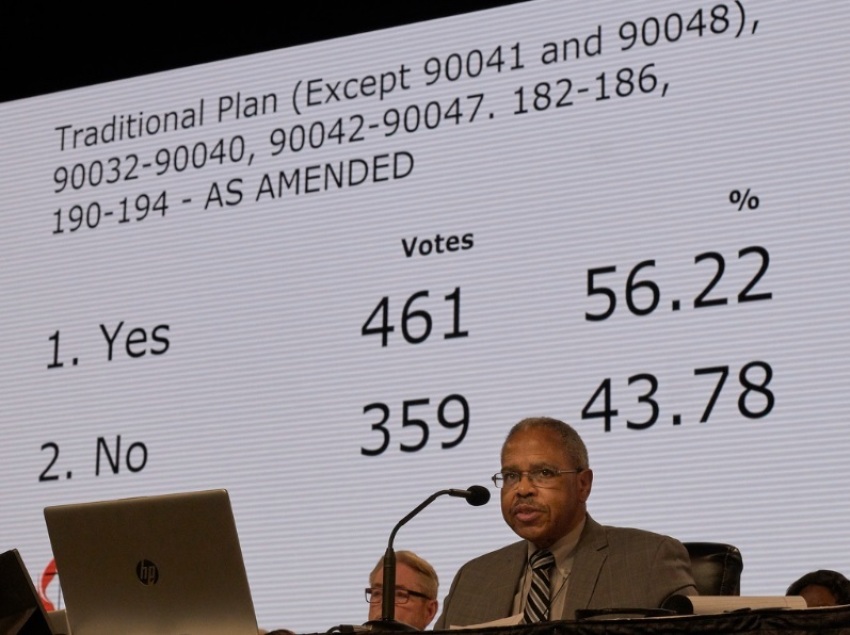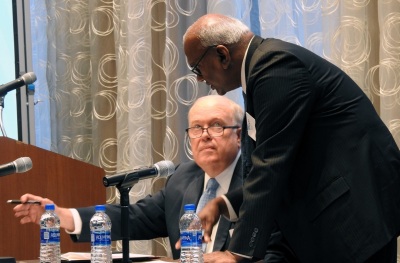UMC experiencing 'financial hangover;' some blame drop in giving on gay marriage ban

The United Methodist Church saw a steep decline in regional body apportionment remittances in the months leading up to and following their special session General Conference on LGBT issues held earlier this year.
Delegates at the special session held last February in St. Louis, Missouri, voted to approve a “Traditional Plan” on LGBT issues, maintaining the UMC’s official opposition to homosexuality while strengthening the punishments for disobeying the Book of Discipline’s ban on same-sex marriage and ordination of noncelibate homosexuals.
The UMC General Council on Finance and Administration met last week in Dallas, Texas. There, it was reported that annual conference apportionment remittances to general church funds for the first half of 2019 was $4.6 million less than the first half of 2018.
The United Methodist News Service described the drop as a “financial hangover from the 2019 General Conference” and quoted North Texas Conference Bishop Michael McKee, GCFA board president, noting that as a possible factor.
“There was an initial reaction to St. Louis that just happened dramatically, and I think we ought to name that,” said McKee, as reported by UMNS.
However, Sharon Dean, chief officer of communications for GCFA, would not credit the special session as the reason for the differing numbers, telling The Christian Post on Tuesday that giving to the UMC “increases and decreases over the course of a quadrennium for many, many reasons.”

“The General Council on Finance and Administration apportions to the annual conferences and they do not report why giving increases or decreases during any period of reporting,” said Dean.
“We do not speculate and always encourage United Methodists to support ministries of the Church through connectional giving.”
Many United Methodists, especially in the United States, took issue with the Traditional Plan passing at special session and have vowed to resist enforcement of the new plan.
Ginger E. Gaines-Cirelli, senior pastor of Foundry United Methodist Church of Washington, D.C., explained at a gathering of progressive UMC members at the Church of the Resurrection in Leawood, Kansas, that there would be a “wide variety of resistance tactics” to the denomination’s official position.
“For some of us, resisting the Traditional Plan means violating the Book of Discipline. For some persons in their context, it might not,” said Gaines-Cirelli at the gathering in May.
“There will need to be a wide variety of resistance tactics all leaning into and seeking to help accomplish the commitments that we have made together here.”
Gaines-Cirelli added that “others will risk other kinds of things, but not for a variety of reasons be able or willing at this time to break the rules of the Plan, of the Discipline.”
While some may have supported withholding money from the UMC over the decision, others who opposed the Traditional Plan have rejected the strategy.
The leadership of the California-Nevada Annual Conference released a statement on July 1 rejecting the idea of withholding apportionments, arguing that such a measure would cause more harm than good.
“In fact, this withholding is primarily expressed in Caucasian congregations whose perception is that their entitlement to control others with money is an expression of white privilege,” stated the Conference.
“The logical end of this flawed thinking is to punish congregations that do not conform to presumptive standards. This is the embodiment of Jim Crow laws.”
They also said that such a move would be “a misdirection of our pain that evades any notion of a redemptive outcome.”
“Many ministries, and the work of boards, and agencies of the church are deeply impacted by non-payment. Understanding all of these ramifications is beyond a comprehensive analysis and will certainly result in some unintended consequences,” they stated.



























